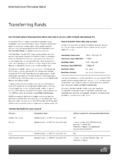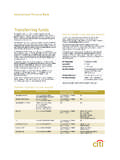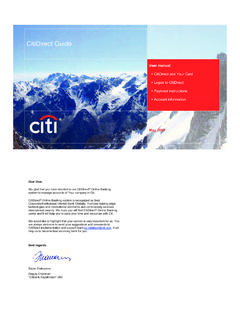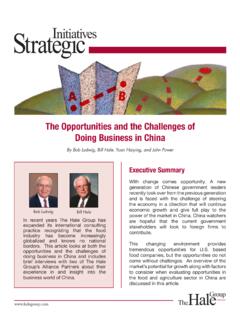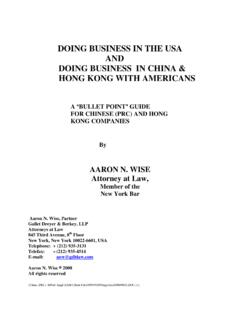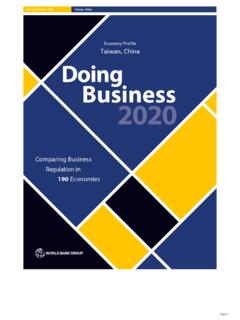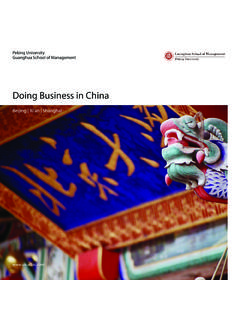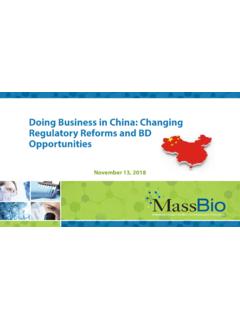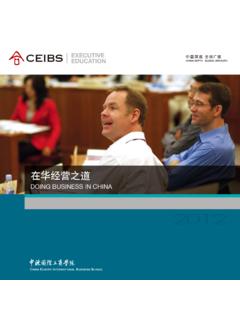Transcription of Doing Business in China –Implications of RMB ...
1 Doing Business in China implications ofRMB internationalization for MultinationalsFor Corporate ClientsINDUSTRY INSIGHTAsia Pacific2011 has had its fair share of major events, politically, economically and environmentally,but it will be remembered as the year in which a new global currency was truly the progress made during 2011 is part of a longer journey towards currencyliberalization, we have seen a huge acceleration in the use of RMB as a cross-bordersettlement currency and rapid development of an offshore RMB market. While theoffshore market remains relatively small, the speed of its development and long termpotential is too great to ignore. This article considers how the RMB is internationalizing,the drivers of this process, and how corporate treasurers can take advantage of Towards LiberalizationThe past few years has witnessed the start of a transformation in the way that RMB istraded both within China and offshore.
2 While RMB is a desirable investment currency, itis largely unattractive to borrow in an appreciating currency. An offshore financingmarket is developing however, centered in Hong Kong, following established offshoremarket practices and encouraged by the Chinese government. The offshore RMB(known as CNH) is priced differently from onshore RMB (CNY) with a spot and forwardmarket and a fast-growing deposit base, reaching RMB622 billion in September Transformation in Cross-Border Trade SettlementOpportunities for RMB cross-border trade settlement have also developed rapidly sinceits initial introduction in 2008. Initially, most cross-border transactions settled in RMBwere imports into China , which were not subject to restriction.
3 By August 2011, the finalrestrictions on exporters were lifted, and any exporter in China is now eligible to settlecross-border trade transactions in RMB. Initially, the volume of transactions settled inRMB under the program was low, but as restrictions on exporters have continued to lift,the volume and value of RMB cross-border flows has accelerated, reaching 10% of totaltrade by mid 2011, with continued rapid growth. More than 67,000+ Chinese companies(more are expected to be approved soon) can now benefit from favourable tax treatmenton RMB-settled flows, and non-residents can open RMB accounts in China for cross-bordertrade, subject to approval from the local governing authority and 10% withholding TRANSACTION SERVICESL everaging the OpportunityThe government s ongoing commitment to liberalization is helping to alleviate companies reticence to invest too heavily in China , which has often resulted in the problem of trapped cash.
4 Restrictions still apply, but the development of an offshore RMB marketand relaxation of cross-border trading restrictions, mean that companies are now in abetter position to enhance their trading and financial position in China . A key issue ishow to maintain competitiveness whilst maintaining access to liquidity. While there areclear advantages for Chinese companies to settling transactions in RMB, as their foreignexchange risk is eliminated, there are also advantages for foreign companies, particularlythose with both payables and receivables in RMB. Currency risk is eliminated and marginspreserved as exposures can be netted, enhancing companies ability to do Business inChina without trapping cash.
5 However, as the examples further in this article illustrate,there are potential benefits for net importers and exporters Trade in RMBAn efficient way of buying and selling in RMB is to establish a re-invoicing center supportedby an in-house bank, as the following examples illustrate:Example 1: Buying and Selling in RMBC ompany A both pays and collects in RMB through a re-invoicing center. The in-housebank then operates a multi-currency notional pool to borrow RMB or a foreign currency(USD in this example) against an offshore RMB or USD deposit as appropriate (Figure 1).Company A then uses a netting service provided by its bank to optimize cash operationsduring the transition period.
6 The benefits of this approach are the following: No need to verify goods with SAFE No bank Pending Verification Approval process is required, accelerating trade andcash flows Ability to leverage lower offshore financing rates for temporary overdrafts Payables and receivables can be offset, reducing FX exposure Greater discipline is introduced into the payment/collection cycle, reducing cashflow spikes and minimizing working capital requirements Balance sheet costs and trapped cash are reducedFor Chinese distributors/suppliers, FX costs and exposures are eliminated as Business isconducted in RMB, and they may also be able to benefit from flexible payment terms. Inthis instance, Company A would need to settle on a gross basis to maximize sales taxclaims based on actual cash 1: Buying and Selling in RMB Through a Re-Invoicing CenterChina Distribution andProduction FacilitiesOther Operating EntitiesRMBRMB (when needed)USD (excess)GoodsMulti-CurrencyNotional PoolRMB Liquidity BankOffshore RMB Deposit/ODOffshore USD Deposit/LoanRe-invoicing Center Companies are now ina better position toenhance their tradingand financial positionin China .
7 A key issue ishow to maintaincompetitiveness whilstmaintaining access toliquidity. Example 2: Selling to China -Based DistributorsCompany B wishes to sell goods and services to distributors in China in RMB (whichcould be a third party distributor or a subsidiary of the group) (Figure 2). Third partydistributors prefer to use RMB to reduce their purchasing costs and FX risk, while forsubsidiary companies, FX exposures can be concentrated offshore to allow moreeffective B collects RMB offshore through a re-invoicing center. The company s in-housebank operates a multi-currency notional cash pool to borrow USD against RMB arrangement brings many of the same advantages to those experienced byCompany A.
8 In addition, Company B is able to fund future investments in China withoutincreasing currency risk or impacting the balance sheet. Company B would, however,need to consider the potential impact should there be a significant change in offshoreliquidity. Secondly, they would need to be selective about which flows to settle in RMB toachieve the optimal level of offshore RMB liquidity, such as covering a 3 year RMB re-investment plan or developing a China -based manufacturing facility exporting goodsback to the home market. Figure 2: Selling in RMB Through a Re-Invoicing CenterExample 3: Buying from China -Based SuppliersCompany C wishes to purchase goods in RMB both from fully-owned subsidiaries(enabling FX exposure to be concentrated offshore for hedging) and from third partycompanies (enabling the cost of purchases to be reduced) (Figure 3).
9 This is achieved byprocessing RMB payments through a re-invoicing center, while an in-house bank borrowsRMB in Hong Kong through a 3 year bond, to fund China exports, with an offshoremulti-currency notional pool. Company C can take advantage of a lower offshorefinancing rate, in addition to many of the benefits outlined in the previous two little long term bank funding available, however, Company C should assess thepotential impact of a sudden change in offshore RMB liquidity, or raise RMB frominvestors. In addition, the company should select trade flows to achieve the optimumlevel of offshore liquidity in order to repay the RMB borrowing. In addition, the possibleimpact of RMB against Company C s functional currency should be 3: Buying in RMB Through a Re-Invoicing CenterRMBG oodsMulti-CurrencyNotional PoolUSDI nterco LoanChina Distribution FacilitiesOther Operating EntitiesOffshore RMB DepositOffshore USD LoanRe-invoicing CenterY3: RMBI nvestmentsGoodsRMB3Y BondsRMBM ulti-CurrencyNotional PoolUSDI nterco LoanChina Production FacilitiesOther Operating EntitiesHong Kong RMB MarketOffshore RMB DepositOffshore USD LoanRe-invoicing CenterY3.
10 RMB fromDividend orDivestitureAchieving its PotentialAlthough there is still a long journey ahead towards liberalization, all companies with aninterest in China need to establish an appropriate strategy for trading in China thattakes into account their procurement, sales and financing needs. A flexible strategy,supported by the right banking partner, will enable companies to take advantage of newopportunities as they arise. The developments in both the offshore RMB market andcross-border trading opportunities are significant both in promoting RMB as a currencyfor trade between Chinese entities and their foreign trading partners, but also as amajor international reserve currency.
